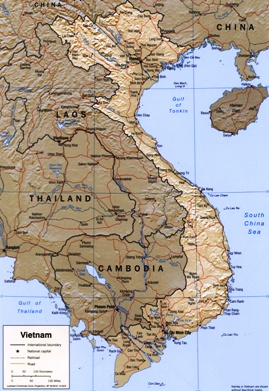History Lessons and Talking with the Taliban
In short, there really are some lessons from past wars that we would do well to heed in Afghanistan.
 I commend Tuesday's op ed in the New York Times by Richard Barrett, who heads the United Nations team charged with monitoring developments involving Al Qaeda or the Afghan Taliban. His comments on Afghanistan are those of an experienced and disinterested observer, not beholden to the policy commitments of any government. His comments also square with observations I recently made on a couple of issues concerning negotiations with the Taliban. My observations were based mainly on historical patterns of negotiating ends to wars. Barrett's observations are based on first-hand monitoring of what is going on in Afghanistan.
I commend Tuesday's op ed in the New York Times by Richard Barrett, who heads the United Nations team charged with monitoring developments involving Al Qaeda or the Afghan Taliban. His comments on Afghanistan are those of an experienced and disinterested observer, not beholden to the policy commitments of any government. His comments also square with observations I recently made on a couple of issues concerning negotiations with the Taliban. My observations were based mainly on historical patterns of negotiating ends to wars. Barrett's observations are based on first-hand monitoring of what is going on in Afghanistan.
One of those issues concerns how combat operations, past or future, relate to the Taliban's willingness to negotiate and to make concessions required for an agreement. I observed that beating up the Taliban militarily even more than they already have been beaten up will not necessarily translate into a more accommodating negotiating position on their part, given that a less favorable bargaining position may make negotiations seem that much less attractive. Military punishment can serve as an inducement to talks, but beyond a certain point the punishment can become counterproductive. Barrett makes a somewhat different but complementary point that the Taliban have taken a lot of punishment already but that a Taliban leadership weakened too much may have trouble carrying through on any agreement. If there is such a thing as a sweet spot—beyond which the productive become counterproductive—in the process of softening up the Taliban, we may already have reached that spot.
Another issue concerns the impediments posed by preconditions and ostensibly nonnegotiable demands. I observed that such preconditions and demands tend to melt into ordinary issues for negotiation once the two sides start talking. Barrett makes essentially the same point in referring to some of the specific issues at hand with Afghanistan. We can expect flexibility, he says, regarding the Taliban's demand for an immediate withdrawal of foreign forces, because the Taliban realize that a hasty departure would mean an increase in fighting as ethnic and clan rivalries re-emerge. On other ostensible preconditions Barrett makes no predictions but envisions a route to compromise—one in which the Taliban accept that taking their members off sanctions lists is a consequence of peace rather than an incentive for it, and in which the Afghan government accepts that the Taliban laying down their arms means exactly that rather than giving up their arms.
In short, there really are some lessons from past wars that we would do well to heed.
Which reminds me of a discussion of the Afghanistan War in which I participated earlier this week and which included a variety of views around the table. The Vietnam War was mentioned, along with its rationale of a domino theory envisioning successive countries falling to communism. Oh, that's not relevant, said a supporter of sustaining the war effort in Afghanistan, because the domino theory was an invalid image of a hypothetical threat whereas in Afghanistan today we face a “real,” immediate threat. Left unsaid was that in the 1960s the widely accepted concept of falling dominoes seemed just as real, just as immediate, and just as threatening as what some see as at stake today in Afghanistan. Forty or fifty years from now, comparable discussions probably will dismiss just as blithely the rationales for war that were voiced in 2010.
And as we think about prosecuting—or trying to end through negotiation—a war that for the United States began as a response to a terrorist attack by Al Qaeda but then became a broader war against the Afghan Taliban, one of Richard Barrett's other observations is worth contemplating:
The Taliban, for all their retrogressive conservatism, are pragmatic Afghans. They have grown up in a culture of negotiation where no one gets everything but no one leaves with nothing. Unlike Al Qaeda, they are a nationalist movement with national objectives, and while they will fight to the last man, they would far prefer to rule.
